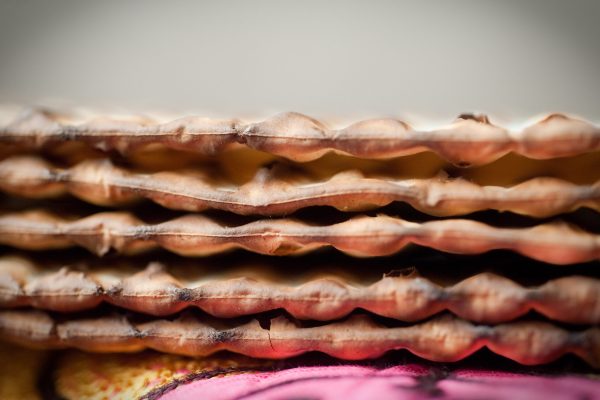In the words of longtime Jewish feminist Francine Klagsbrun, “Women’s seders have become a phenomenon of our time…From New York to Nebraska, from Berlin to London, thousands of Jewish women throughout the world celebrate the Passover holiday every year with an evening of ceremony and remembrance led by women for women.”
Why—and how—a seder primarily for women? What is a “women’s seder”?
The timing of a women’s seder—most frequently just before Passover (obviating the need for the food to be strictly kosher for Passover), or on a night during Passover other than the first two evenings (when women might want to be or be expected to be participating in more typical seders with a mixed-gender group of family and friends)—already suggests its position in Jewish ritual life. The women’s seder stands a bit on the margin, critiquing, supplementing, and serving as an implicit commentary on the traditional seder experience with its haggadah text. While for some women this is their most important—or in some cases only—significant connection to Passover, for the most part attendance at a women’s seder serves to add a feminist, woman-centered dimension to the observance of the universally Jewish holiday of Passover.
Is all this really necessary? Haven’t women become fully integrated as equals into all aspects of Jewish communal life, both religious and secular? Why a separate women’s gathering for this Jewish national celebration?
To answer these questions, we need to return to the very beginnings of Jewish national life, to the Exodus story in the Torah. The biblical tale of slavery and redemption is replete with stories of magnificently courageous women playing key roles in the saving and liberation of the Jewish people—and crossing national boundaries as they do it:
-
-
- The midwives, Shifra and Puah, either Hebrew women themselves or Egyptian women attending them, defying Pharoah’s orders and helping male Hebrew babies live
- Pharoah’s daughter, adopting the baby she saves from the river Nile (did she know he was an Israelite?)
- Miriam, Moses’ sister, first (according to one midrash, or rabbinic legend) ensuring that her parents would reunite and produce her people’s human redeemer, then connecting Pharoah’s daughter with a nursemaid for the baby—Yocheved, his (and Miriam’s) mother
-
To read the biblical story of the Exodus with open eyes is to understand Passover as, among other things, a celebration of women’s heroism. But in the traditional haggadah, women are missing. True, Moses is absent too, and the telling of the biblical story focuses on God’s intervention and liberation, not human agency—but in the many references to human beings throughout the haggadah, it is men and boys who are referred to, and women and girls who are invisible.
If it were simply the need for feminist critique that motivated the emergence and persistence of women’s seders, dayeinu—that would be enough. But there is more: the Passover story is, at its core, one of freedom from oppression, from the expectation that one group of people will be subservient to another. It is fundamentally a story of liberation—a story the telling of which feminists not only critique, as above, but also embrace, as elemental to our own journey as Jewish feminists.
The first feminist seder was organized by Esther Broner, Marcia Freedman, and Naomi Nimrod in Haifa in 1975, and led to the production of the The Women’s Haggadah, which followed the traditional seder outline but used that structure to speak of Jewish women in our ancient past as well as contemporary Jewish women’s experience. Since then, feminist haggadot have continuously emerged—from the cobbled-together photocopied pages of a group of friends to the professionally published The Journey Continues by Ma’yan, pioneers and leaders in creating and developing large community women’s seders—paying tribute to women past and present, raising feminist questions, re-interpreting familiar rituals and prayers, and articulating a feminist vision of redemptions yet to come.
Women’s seders and other Jewish feminist practices in connection with Passover have had their impact on the shape of the seder experience as a whole in many homes and institutions. Already there is a generation of children who would be confused if there were no Miriam’s cup on the table, filled with water (and often paired with Elijah’s cup of wine)—a symbol of redemption and possibility. And in many homes the placement of an orange on the seder plate—whether to represent the importance of women’s full inclusion in Judaism, or to symbolize the need for gay and lesbian equality in Jewish life—is already de rigueur.
Finally, with so many feminist readings and interpretations available for every element of the haggadah and the seder meal, many family seders benefit from the rich resources that have emerged from the liturgy prepared for women’s seders and from the wider Jewish feminist engagement with Passover. Just as the emergence of the field of women’s history has not let “regular history” off the hook from including women thoroughly in its rendering of the past, so too, women’s seders help infuse other seders with a focus on women as well as men, and with a feminist voice.
Still, the Jewish feminist journey is far from over—and women’s gatherings are an important part of that journey. With song, with ritual, with story and prayer, Jewish women all over the world gather each Passover to name what is, and to dream of—and works toward—what is yet to be.











